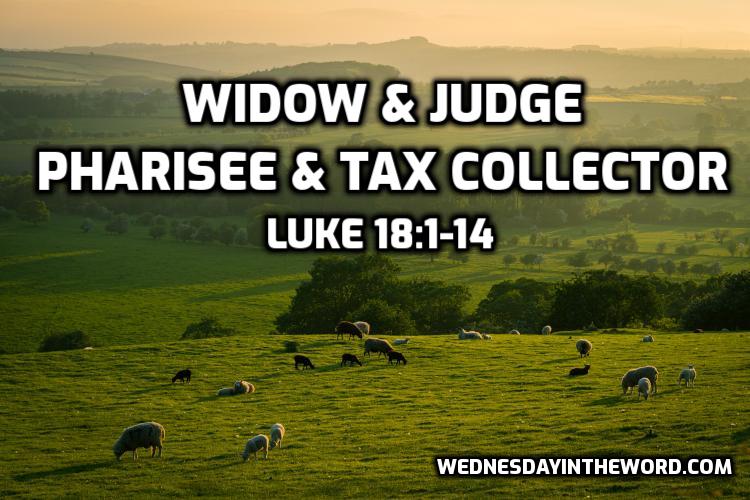Both the parable of the Widow & the Unjust Judge and the Pharisee and the Tax-gatherer (Luke 18) deal with prayer, and underlying that prayer is the theme of how justification is achieved. In the first parable (the widow & the judge), the contrast is between trusting God or turning to despair. In the second parable (the Pharisees & the taxgatherer), the contrast is between trusting in yourself and trusting God.
Parable of the Widow and the Unjust Judge
1And he told them a parable to the effect that they ought always to pray and not lose heart. 2He said, “In a certain city there was a judge who neither feared God nor respected man. 3And there was a widow in that city who kept coming to him and saying, ‘Give me justice against my adversary.’ 4For a while he refused, but afterward he said to himself, ‘Though I neither fear God nor respect man, 5yet because this widow keeps bothering me, I will give her justice, so that she will not beat me down by her continual coming.’” 6And the Lord said, “Hear what the unrighteous judge says. 7And will not God give justice to his elect, who cry to him day and night? Will he delay long over them? 8I tell you, he will give justice to them speedily. Nevertheless, when the Son of Man comes, will he find faith on earth?” – Luke 18:1-8
- Judges at the time were notoriously corrupt. The Talmud writes of village judges who “were willing to pervert justice for a dish of meat.”
- This judge has no sense of right or wrong.
- This judge has no sense of shame (he did not respect man). Shame and honor were critical aspects of the culture.
- This judge does not fear God. There is no way to reach him.
- Widows typically symbolized the innocent, powerless and oppressed.
- Ordinarily the women’s nearest male relative should represent her in court. She must be truly alone to represent herself.
- The widow is asking for justice. The language suggests right is on her side.
- The judge gives in because of the widow’s persistence.
- Jesus contrasts the judge with God, pointing to God’s justice and patience.
- This parable is told to the disciples (18:1) a few weeks before Jesus enters Jerusalem to face the cross (Luke 17:22).
- Jesus is encouraging them to persevere in the faith (Luke 18:1; Luke 18:8).
- The point not so much to pray, as it is to continue to trust. If you continue to trust in God, then you will pray because where else are you going to go?
- We have every reason to trust God to bring about justice, therefore trust and don’t give up. Those are the only two options: pray or lose heart. One will lead to prayer the other to despair.
The Pharisee and the Tax Collector
9He also told this parable to some who trusted in themselves that they were righteous, and treated others with contempt: 10“Two men went up into the temple to pray, one a Pharisee and the other a tax collector. 11The Pharisee, standing by himself, prayed thus: ‘God, I thank you that I am not like other men, extortioners, unjust, adulterers, or even like this tax collector. 12I fast twice a week; I give tithes of all that I get.’ 13But the tax collector, standing far off, would not even lift up his eyes to heaven, but beat his breast, saying, ‘God, be merciful to me, a sinner!’ 14I tell you, this man went down to his house justified, rather than the other. For everyone who exalts himself will be humbled, but the one who humbles himself will be exalted.” – Luke 18:9-14
- The audience for this parable is a larger crowd than the disciples (Luke 18:9).
- These two men are attending corporate worship at the temple,
- The most likely the morning or evening service for atoning sacrifice. During the burning of incense, there was a time for individuals to pray out loud.
- The Pharisee stands by himself to keep himself clean.
- The Pharisee considers himself justified before God and despises other sinners.
- The Pharisee prays the prayer of the “religiously superior”, to enlighten other listeners with his wisdom.
- By contrast, The tax gatherer expresses extreme remorse.
- The tax gatherer stands by himself because he does not consider himself worthy to approach.
- The tax gatherer asks specifically for his sins to be covered by the atoning sacrifice.
- Justification is the forgiveness of our debt to justice which qualifies us to receive Life. To be justified is to be in a position where God’s justice is satisfied.
- Justification is a gift from God, based on God’s mercy and made possible by the sacrificial death of Jesus Christ.
- Justification is granted to those who have saving faith.
- The Pharisee is trusting in himself that he is justified, while the tax gatherer is counting on the mercy of God.
From the widow, we learn to stand firm in our faith, to persevere no matter how dark it seems. The mercy of God is our only hope for justification, there is no where else to turn.
From the Pharisees & the tax gatherer we learn that we can’t earn our way to justification, but that God is His mercy grants justification to those who approach with a humble broken heart, based on the blood of Christ.
Please listen to the podcast for more detail and explanation.
Next: The Vineyard Workers, Matthew 19:16-20:16
Previous: The Unforgiving Servant, Matthew 18:21-35
Series: Parables of Jesus
Photo by Illiya Vjestica on Unsplash

